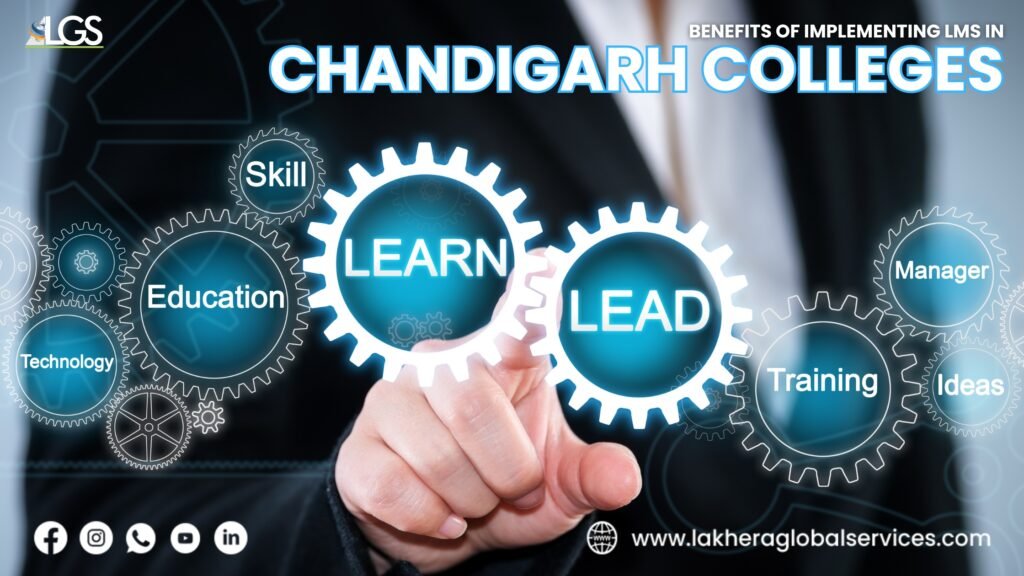As education evolves rapidly with the adoption of digital tools, more colleges are turning to Learning Management Systems (LMS) to enhance their academic infrastructure. For institutions in fast-growing education hubs like Chandigarh, an LMS is no longer a luxury—it’s a necessity.
In today’s highly competitive landscape, students expect flexibility, interactive content, and real-time feedback—something traditional classroom models often struggle to deliver. For Chandigarh colleges that aim to attract tech-savvy students and offer a future-ready educational environment, adopting an LMS is no longer optional. It’s a crucial investment toward scalability, personalization, and overall academic performance.
This blog explores the benefits of implementing LMS in Chandigarh colleges and why it’s a timely move for institutions that are serious about digital transformation. From improving student learning journeys to helping colleges stay compliant with academic standards, we’ll cover every aspect that shows how an LMS can revolutionize your institution.
Why LMS Adoption Is on the Rise in Chandigarh
Chandigarh is witnessing a surge in educational activity, with students seeking more flexible, tech-enabled learning options. LMS platforms allow colleges to meet these demands efficiently. From blended learning to performance tracking, a robust LMS can transform traditional classrooms into modern learning environments.
1. Streamlined Course Management
What it means:
LMS platforms centralize all course content, making it easy for faculty to upload lectures, assignments, and quizzes in one place.
Why it’s beneficial:
- Reduces administrative burden on teachers.
- Ensures students have 24/7 access to course materials.
- Enables faster course updates and content customization.
Example: A college in Chandigarh can create semester-wise modules and allow students to revisit concepts anytime—perfect for exam preparation and remedial learning.
2. Enhanced Student Engagement
What it means:
LMS platforms come with interactive tools like discussion boards, quizzes, polls, and gamified learning features.
Why it’s beneficial:
- Encourages active participation in class.
- Helps shy or introverted students engage in discussions.
- Makes learning more enjoyable and less monotonous.
Pro Tip: Colleges can use forums to host weekly debates or reflections on assignments, making students more involved in the learning process.
3. Better Performance Tracking and Analytics
What it means:
An LMS tracks each student’s progress, grades, and attendance in real time.
Why it’s beneficial:
- Faculty can identify struggling students early.
- Data-driven reports help improve curriculum design.
- Students receive personalized feedback based on performance.
Bonus Insight: Admins can generate insights about student attendance, time spent on modules, and quiz results, helping them optimize the academic calendar.
4. Efficient Communication and Collaboration
What it means:
Integrated messaging and announcement systems keep all stakeholders in the loop.
Why it’s beneficial:
- Minimizes reliance on external apps like WhatsApp or email.
- Enhances communication between students, faculty, and parents.
- Encourages collaborative group assignments with built-in tools.
Example: Announcements about schedule changes or assignments can be pushed instantly to everyone without confusion.
5. Cost Savings and Administrative Efficiency
What it means:
Digitizing the learning process reduces paper use, printing costs, and manual record-keeping.
Why it’s beneficial:
- Frees up admin staff from repetitive tasks.
- Cuts down logistical costs.
- Reduces the institution’s carbon footprint.
Stat Insight: Colleges that implement LMSs have reported a 30–50% reduction in administrative workload within the first year.
6. Scalability and Flexibility
What it means:
LMS platforms can handle a growing number of students and courses without disruption.
Why it’s beneficial:
- Ideal for colleges expanding their academic offerings.
- Supports part-time, full-time, and distance learners.
- Easily integrates new departments or programs.
Case Example: A college launching new certification programs can create separate learning paths on the LMS for targeted audiences.
7. Integration With Other EdTech Tools
What it means:
Modern LMS platforms are designed to integrate with tools like Zoom, Google Classroom, CRMs, and more.
Why it’s beneficial:
- Simplifies tech adoption.
- Ensures seamless data exchange across platforms.
- Increases functionality without complicating workflows.
Expert Tip: Colleges in Chandigarh can also sync their LMS with digital marketing CRMs to track student behavior from inquiry to enrollment.
8. Improves Accreditation and Compliance
What it means:
LMS systems maintain detailed logs of student progress, curriculum completion, and faculty activity.
Why it’s beneficial:
- Simplifies the documentation required for NAAC or AICTE audits.
- Supports compliance with regulatory bodies.
- Ensures transparency and accountability.
9. Supports Hybrid and Remote Learning Models
What it means:
With an LMS, colleges can offer a mix of online and offline learning (blended learning) or go fully remote when needed.
Why it’s beneficial:
- Ensures learning continuity during disruptions (like COVID-19).
- Attracts students from beyond Chandigarh.
- Offers flexibility to students with varied schedules.
Real Impact for Chandigarh Colleges
With the education sector in Chandigarh becoming increasingly competitive, adopting an LMS gives colleges a technological edge. Institutions that embrace digital solutions are better positioned to attract modern learners, increase retention, and offer more personalized education.
Conclusion: Modernize Your College With LMS Today
Investing in an LMS isn’t just about keeping up with trends—it’s about future-proofing your college. From streamlining operations to creating a student-centric experience, the benefits are undeniable. As educational expectations grow, having a reliable and customizable LMS becomes a cornerstone of institutional success.
At Lakhera Global Services Pvt Ltd, we help educational institutions in Chandigarh adopt and optimize LMS platforms tailored to their needs. From setup to training, integration to support—we’ve got you covered.
Ready to Go Digital With LMS?
Partner with us to implement a powerful, student-friendly LMS in your college.
FAQs: LMS in Chandigarh Colleges
1. What is an LMS and how does it work?
A Learning Management System is a software platform that facilitates the creation, delivery, and management of educational content and student data.
2. Is LMS suitable for smaller colleges in Chandigarh?
Yes, LMS platforms are scalable and can be customized to fit institutions of all sizes.
3. How much time does it take to implement an LMS?
Implementation typically takes 2–6 weeks depending on complexity and requirements.
4. Can LMS integrate with our existing college ERP system?
Most LMS platforms support seamless integration with ERPs, CRMs, and other tools.
5. Does Lakhera Global Services offer LMS setup support?
Absolutely! We provide end-to-end LMS solutions including setup, integration, training, and ongoing support.









